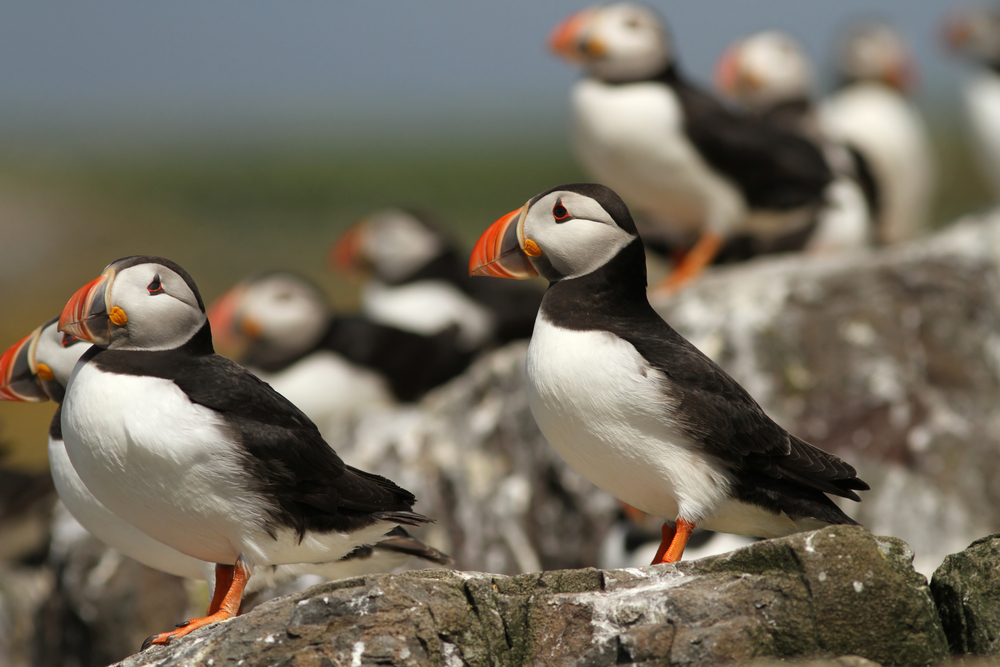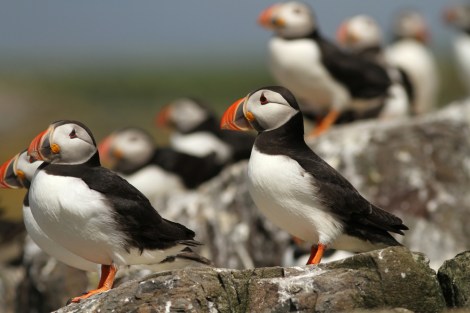Puffins, terns, and butterflies are among the key species in the U.K. being put at risk from global warming, which is transforming the U.K.’s coastal areas as sea levels rise and storms grow fiercer, a study by the National Trust has found.
Sea levels are predicted to rise by up to half a meter by the turn of the century, and coastal erosion is accelerating, with a fourfold increase in landslips reported.
Puffin chicks are having a particularly hard time — their preferred meal of sand eels is disappearing, owing to overfishing and changing ocean temperatures, and in their place a new fish has moved into U.K. waters that the chicks find indigestible. The newcomer is the snake pipefish, normally found in warmer waters but moving northwards as the climate changes — with devastating effects for puffins, as it is bony and hard for the birds to eat. Some chicks have been found dead, the trust reports, having choked trying to swallow pipefish.
Another problem for the species, colonies of which can be found in the Farne Islands and at Lundy Island in Devon, is that their burrows were flooded during last year’s exceptionally wet summer, which was followed by the unusually long winter, causing many to die of starvation.
Little terns are another species that could suffer: They are vulnerable to unusually high tides and storms, both of which are likely to hit more frequently as climate change takes hold. When they migrate to the U.K. each spring, they tend to site their colonies just above the high tide line, so when storm surges strike their nests can easily be flooded.
But while coastal erosion spells danger for some species, and for people’s homes, for a small number of adapted creatures it is a boon. The Glanville fritillary butterfly can only live on coasts that are gradually eroding, where plants are only beginning to colonize newly uncovered areas. This is a precarious existence, because both increased erosion, which wipes out plants, and human efforts to recapture coasts, which involve much greater plant growth to hold soils in place, can both spell disaster for the butterfly.
Its preferred food source while a caterpillar is ribwort plantain, which is now far less widespread owing to intensive farming. The butterfly was once found as far north as Lincolnshire, but is now only found on coastal landslips on the southwest of the Isle of Wight.
David Bullock, head of nature conservation at the National Trust, said: “The coast is at the forefront of how a changing climate will affect wildlife in the U.K. and is very vulnerable to the forces of change. Over the past decade we’ve been developing a better understanding of the coastline that we care for and in particular the 50 percent that will be affected by increased coastal erosion or flooding in the future. Plants, animals, and ourselves will have to live with an increasing rate of environmental change.”
Matthew Oates, a specialist on wildlife at the trust, added: “Climate change could change the face of our coastal flora and fauna. With rising sea levels, our rich mud flats could simply disappear. Wildlife which relies on the gradual erosion of soft rock cliffs or lives on loose sand and shingle habitats could be caught out by an increasingly mobile landscape as a result of extremes in weather.
“We are likely to see the boom and bust of more specialist plants and animals, as they suffer from increased flooding, salt deposition, or drought stress. Unfortunately, there may be more bust than boom.”
The trust has also identified the oyster plant, which grows on exposed shingle beaches, as being at risk, and the cliff tiger beetle, which lives on bare exposed clay. Invasive species such as the grey triggerfish are also being found in the U.K. for the first time, with unpredictable effects on the local ecology of inshore waters.
 This story first appeared on the Guardian website as part of the Climate Desk collaboration.
This story first appeared on the Guardian website as part of the Climate Desk collaboration.




